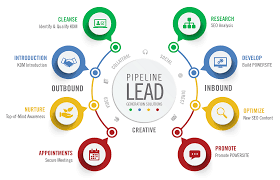The Power of Lead Generation in Digital Marketing
In the ever-evolving landscape of digital marketing, lead generation stands out as a crucial strategy for businesses looking to expand their customer base and boost sales. Simply put, lead generation is the process of attracting and converting prospects into potential customers who have shown interest in your products or services.
Why is Lead Generation Important?
Effective lead generation not only helps businesses identify and target potential customers but also nurtures relationships with them throughout the buying journey. By capturing leads through various digital channels such as social media, email marketing, and search engine optimisation (SEO), companies can create a pool of interested individuals who are more likely to convert into paying customers.
Key Strategies for Successful Lead Generation:
- Content Marketing: Creating valuable and relevant content that attracts and engages your target audience is essential for generating leads. This can include blog posts, videos, infographics, and eBooks.
- Social Media Marketing: Leveraging social media platforms to promote your products or services, engage with followers, and drive traffic to your website can be a powerful lead generation tool.
- Search Engine Optimisation (SEO): Optimising your website for search engines helps improve visibility and attract organic traffic, increasing the chances of generating quality leads.
- Email Marketing: Building an email list allows you to nurture leads by sending targeted campaigns that provide valuable information, promotions, and incentives to encourage conversions.
The Role of Data in Lead Generation:
Data plays a vital role in lead generation by providing insights into customer behaviour, preferences, and trends. By analysing data collected from various digital marketing efforts, businesses can refine their strategies, personalise their communications, and continuously improve the lead generation process.
Measuring Success:
To gauge the effectiveness of lead generation campaigns, businesses must track key performance indicators (KPIs) such as conversion rates, cost per lead, return on investment (ROI), and customer acquisition cost. By monitoring these metrics regularly, companies can identify areas for improvement and optimise their strategies for better results.
In Conclusion
Lead generation is a cornerstone of successful digital marketing strategies that drive growth and revenue for businesses. By implementing targeted tactics across multiple channels and leveraging data-driven insights, companies can attract high-quality leads that are more likely to convert into loyal customers.
Understanding Lead Generation in Digital Marketing: Key Strategies, Importance, and Metrics for Success
- What is lead generation in digital marketing?
- Why is lead generation important for businesses?
- What are the key strategies for successful lead generation?
- How does data play a role in lead generation?
- What metrics should businesses track to measure the success of their lead generation campaigns?
What is lead generation in digital marketing?
Lead generation in digital marketing refers to the process of identifying, attracting, and converting potential customers into leads through various online channels. It involves creating compelling content, engaging with the target audience, and capturing contact information to nurture relationships and guide prospects towards making a purchase. By leveraging strategies such as content marketing, social media outreach, SEO optimisation, and email campaigns, businesses can generate valuable leads that have expressed interest in their products or services. Lead generation is essential for building a sustainable customer base and driving revenue growth in the competitive digital landscape.
Why is lead generation important for businesses?
Lead generation is paramount for businesses as it serves as the lifeblood of sustainable growth and success. By actively engaging in lead generation strategies, businesses can identify and connect with potential customers who have expressed interest in their products or services. This targeted approach not only increases the likelihood of conversions but also nurtures valuable relationships with prospects throughout their buying journey. Ultimately, effective lead generation empowers businesses to expand their customer base, boost sales, and drive long-term profitability by capturing and converting high-quality leads into loyal customers.
What are the key strategies for successful lead generation?
When it comes to successful lead generation in digital marketing, key strategies play a pivotal role in attracting and converting prospects into potential customers. Content marketing stands out as a fundamental strategy, where creating valuable and engaging content helps capture the interest of the target audience. Social media marketing is another crucial tactic, leveraging platforms to promote products or services and drive traffic. Additionally, search engine optimisation (SEO) plays a vital role in improving visibility and attracting organic traffic. Email marketing, with its ability to nurture leads through targeted campaigns, also proves to be an effective strategy in converting prospects into loyal customers. By implementing these key strategies cohesively, businesses can enhance their lead generation efforts and drive sustainable growth.
How does data play a role in lead generation?
Data plays a critical role in lead generation within the realm of digital marketing. By harnessing data insights, businesses can gain a deeper understanding of their target audience’s preferences, behaviours, and interactions with their brand. This valuable information enables companies to create more targeted and personalised marketing campaigns that resonate with potential leads, increasing the likelihood of conversion. Additionally, data analysis allows businesses to measure the effectiveness of their lead generation strategies, identify areas for improvement, and adapt their approach to optimise results. In essence, data empowers businesses to make informed decisions that drive successful lead generation efforts in the digital landscape.
What metrics should businesses track to measure the success of their lead generation campaigns?
In the realm of lead generation digital marketing, businesses should diligently track specific metrics to assess the effectiveness of their campaigns. Key performance indicators (KPIs) such as conversion rates, cost per lead, return on investment (ROI), and customer acquisition cost play a pivotal role in measuring the success of lead generation efforts. By monitoring these metrics closely, businesses can gain valuable insights into the performance of their campaigns, identify areas for improvement, and make data-driven decisions to optimise their strategies for maximum impact and results.


Leave a Reply